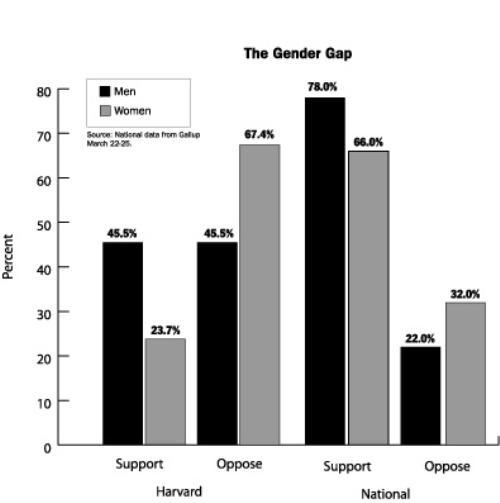
News
Summers Will Not Finish Semester of Teaching as Harvard Investigates Epstein Ties

News
Harvard College Students Report Favoring Divestment from Israel in HUA Survey

News
‘He Should Resign’: Harvard Undergrads Take Hard Line Against Summers Over Epstein Scandal

News
Harvard To Launch New Investigation Into Epstein’s Ties to Summers, Other University Affiliates

News
Harvard Students To Vote on Divestment From Israel in Inaugural HUA Election Survey
Crimson Poll: Harvard Students, Nation Diverge

On the first full day of war in Iraq, March 20, The Crimson conducted a telephone poll of Harvard undergraduates’ opinions on the war, the fight against terrorism and other related topics. Partial results of the poll, which surveyed 400 randomly selected students, were published in Friday’s news section, along with a front page story, “Crimson Poll: Majority Against Military Action.” Below is the full survey and response data, along with more analyses and comparisons to national public opinion data.
Harvard undergraduates diverge from the greater public in a number of important ways. Most obviously, they are far more opposed to the war than the public nationwide. Harvard undergrads were more pessimistic about the war earlier. And a gender gap—in which women tend to oppose the war more then men—was wider at Harvard than elsewhere.
The 400 students came from a pool of roughly 1000 undergrads called over the course of 12 hours on March 20. Respondents were asked 10 questions. All poll results—including the national data—had margins of error of less than +/- 5%.
Question 1 : To what extent do you support or oppose the current U.S. military action against Iraq, on a scale of 1 to 5, with 1 being “strongly support,” 2 being “somewhat support,” 3 being “undecided,” 4 being “somewhat oppose,” and 5 being “strongly oppose.”
- Strongly Support 13.0%
- Somewhat Support 21.8%
- Undecided 9.5%
- Somewhat Oppose 28.0%
- Strongly Oppose 27.7%
Question 2 (asked of those who opposed the military action or were undecided): Would you have supported a U.N.-backed military action?
- Yes 51.5%
- No 21.5%
- Undecided 26.9%
Question 3 (asked of those who supported the military action): Which of the following should be the top U.S. objectives for this military action: removing Saddam Hussein from power, eliminating the threat of biological and chemical weapons, both or something else?
- Remove Sadam Hussein from power 8.6%
- Eliminate the threat of biological and chemical weapons 8.6%
- Both 80.5%
- Something else 2.1%
Question 4: Would you ever consider volunteering to serve in this military action?
- Yes 21.8%
- No 72.5%
- Undecided 4.3%
- No response 1.3%
Question 5: To what extent do you support or oppose the Bush Administration's handling of its war against terrorism, on a scale of 1 to 5, with 1 being "strongly support," 2 being "somewhat support," 3 being "undecided," 4 being "somewhat oppose," and 5 being "strongly oppose."
- Strongly Support 9.5%
- Somewhat Support 19.3%
- Undecided 18.0%
- Somewhat Oppose 29.8%
- Strongly Oppose 23.5%
Question 6: To what extent do you support or oppose the Bush Administration's handling of this military action against Iraq, on a scale of 1 to 5, with 1 being "strongly support," 2 being "somewhat support," 3 being "undecided," 4 being "somewhat oppose," and 5 being "strongly oppose."
- Strongly Support 9.5%
- Somewhat Support 15.5%
- Undecided 13.0%
- Somewhat Oppose 24.3%
- Strongly Oppose 37.3%
Question 7: Do you have any relatives or close friends in the armed services who could be involved in this military action?
- Yes 36.5%
- No 62.5%
- Don't Know/ No response 0.1%
Question 8: In your opinion, is the U.S. military involvement in Iraq more likely to be fairly quick and successful or long and costly?
- Quick and successful 40.5%
- Long and Costly 45.0%
- Don't Know/ No response 14.5%
Question 9 and 10 asked respondents' class year and sex. 47.5% of respondents were female and 52.5% of respondents were male. 17.8% of respondents were members of the class '03, 23.5% were members of the class of '04, 26% were members of the class of '05, and 32.5% were members of the class of '06.
Further analysis:
Want to keep up with breaking news? Subscribe to our email newsletter.
